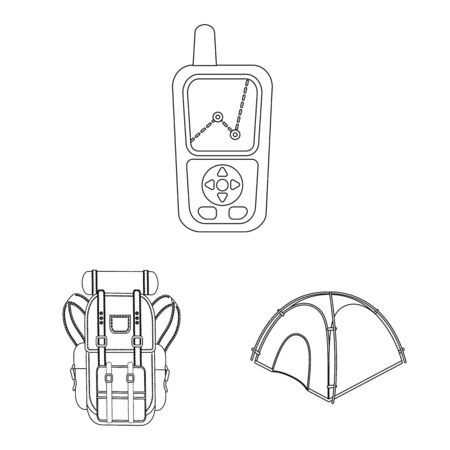1. Understanding Your Camp Style
When it comes to choosing between a backpack and a duffel bag for your camping trip, the first step is understanding your camping style. The type of adventure you’re planning has a big impact on which kind of bag will be the most practical and efficient for packing your gear.
Different Camping Styles and Their Bag Needs
Let’s break down some common camping styles in the U.S. and see how each one influences the type of bag that works best:
| Camping Style | Description | Best Bag Type | Why It Works |
|---|---|---|---|
| Car Camping | You drive directly to your campsite and park nearby. Convenience and comfort are key. | Duffel Bag | Easy to carry short distances, roomy for bulky items like pillows, blankets, or camp chairs. |
| Backpacking | You hike into your campsite, carrying everything on your back over a distance. | Backpack | Designed for ergonomic weight distribution, hands-free mobility, and trail efficiency. |
| Backcountry Trips | More remote than regular backpacking, often with rough terrain and longer hikes. | Technical Backpack | Offers better support, weather resistance, and access to gear while on the move. |
| Overlanding/Road Trips | You travel by vehicle over long distances, sometimes off-road, stopping at various campsites. | Duffel (especially soft-sided) | Packs easily into trunks or rooftop carriers; flexible shape fits awkward spaces. |
Think About Accessibility and Organization
If you need to grab items quickly or prefer to keep things organized by category (like kitchen gear vs. clothing), duffels offer easy top access. Backpacks usually have multiple compartments but may require unpacking to reach gear at the bottom.
Tip:
If youre mixing car camping with short hikes, consider using both—a backpack for hiking essentials and a duffel for basecamp supplies.
Your Next Step:
Now that youve matched your camp style with a bag type, its time to look deeper into what each option offers in terms of features and comfort. Stay tuned for the next section!
2. Backpacks: When They’re the Best Fit
Backpacks are a go-to choice for many campers, especially when your trip involves hiking, climbing, or heading deep into the backcountry. These bags are designed to sit comfortably on your back and distribute weight evenly across your shoulders and hips, making them ideal for longer treks where mobility matters.
Mobility and Hands-Free Convenience
One of the biggest perks of using a backpack is how easy it is to move around. Whether you’re scrambling over rocks or navigating narrow trails, having both hands free makes a big difference. This freedom allows you to use trekking poles, check maps, or grab snacks without needing to stop and drop your gear.
Weight Distribution for Comfortable Carrying
Backpacks are built with ergonomic support in mind. Most quality camping backpacks come with padded shoulder straps, hip belts, and adjustable load lifters that help distribute the weight properly. This reduces strain on your back and shoulders during long hikes.
Key Backpack Features That Help with Weight Distribution:
| Feature | Benefit |
|---|---|
| Padded Shoulder Straps | Reduces pressure on shoulders |
| Hip Belt | Transfers weight to hips for better balance |
| Sternum Strap | Keeps shoulder straps stable |
| Internal Frame | Adds structure and helps support heavy loads |
Versatility for Off-Grid Adventures
If your camping trip includes unpredictable terrain or multiple days off-grid, a backpack gives you the flexibility to carry everything from sleeping bags to cooking gear while keeping things organized. Most packs have multiple compartments, exterior loops for tools or trekking poles, and hydration system compatibility — all features that make life easier out in the wild.
When to Choose a Backpack:
- You’re planning long hikes or backcountry travel
- You need even weight distribution for comfort
- You want hands-free movement on rugged terrain
- You prefer organized compartments for your gear
If your camping adventure calls for mobility, comfort, and readiness for rough trails, a backpack might just be your best bet.

3. Duffels: The Case for Simplicity and Space
If youre car camping, packing for a quick weekend getaway, or just want to keep your gear organized without the fuss, duffel bags might be your go-to. While backpacks are great for backcountry hikes and long treks, duffels offer a straightforward, no-nonsense approach that makes packing and unpacking a breeze.
Why Choose a Duffel Bag?
Duffel bags are all about ease and volume. Their wide openings make it simple to see everything inside at a glance—no digging around like you would in a backpack. Most models come with soft sides, which means they can flex and mold around other items in your trunk or backseat. Whether youre tossing in bulky sleeping bags or stacking layers of clothes, duffels adapt.
Ideal for Car Camping
When youre not carrying your gear on foot for miles, weight distribution isnt as critical. That’s why many car campers prefer duffels—they’re easy to carry short distances and allow fast access to everything inside. You can pack your gear by category (like kitchen supplies, clothes, or sleeping essentials) into separate duffels, then grab exactly what you need when you get to camp.
Great for Gear Organization
Duffel bags work perfectly with packing cubes or stuff sacks. Organizing your gear this way helps you stay tidy even in the wild. Plus, many duffels have side pockets or compartments that are perfect for separating dirty laundry or muddy shoes from clean clothes.
The Weekend Warriors Best Friend
If your camping trips are more spontaneous—maybe a quick overnight stay at a state park or a last-minute road trip—a duffel is all you need. Just throw in the basics and hit the road. No complicated straps or adjustments needed.
Duffel vs. Backpack: Quick Comparison
| Feature | Duffel Bag | Backpack |
|---|---|---|
| Best For | Car camping, organized storage, short trips | Hiking, long-distance travel, backcountry camping |
| Accessibility | Wide opening for easy access | Top-loading; harder to reach bottom items |
| Packing Style | Flexible layout; works well with packing cubes | Structured compartments; suited for vertical packing |
| Portability | Easy to carry short distances; often has shoulder straps | Designed for carrying long distances on your back |
Duffel bags offer simplicity, space, and convenience—all key elements when efficiency matters most during your camping prep. If your adventures tend to start with a car ride rather than a trailhead, a trusty duffel might just be your best packing companion.
4. Key Features to Consider
When it comes to choosing between a backpack and a duffel for your camping trip, it’s not just about personal preference — it’s about what works best for your gear, your destination, and how you travel. Let’s break down the key features that can help guide your decision.
Capacity
The size of your bag matters, especially if you’re packing for multi-day trips or need to carry bulky gear like sleeping bags or cooking equipment. Backpacks generally come in liter measurements (like 50L, 65L), while duffels are often measured in cubic inches or gallons.
| Bag Type | Best For | Typical Capacity Range |
|---|---|---|
| Backpack | Hiking, backcountry camping | 40L – 80L |
| Duffel | Car camping, base camps | 50L – 120L+ |
Materials
The durability of your bag depends heavily on the materials used. High-denier nylon and polyester are common in backpacks because they’re lightweight yet strong. Duffels often use heavy-duty canvas or reinforced tarpaulin for extra toughness.
- Nylon: Lightweight and abrasion-resistant, good for backpacking.
- Canvas: Durable but heavier, more common in duffels.
- Tarpaulin: Waterproof and rugged—great for wet conditions or rough handling.
Weather Resistance
If youre heading into unpredictable weather, water resistance becomes crucial. Some bags come with built-in waterproofing, while others may require an additional rain cover.
| Bag Type | Weather Resistance Level | Add-ons Needed? |
|---|---|---|
| Backpack | Moderate (often water-resistant) | Might need a rain cover |
| Duffel | High (especially with waterproof models) | Seldom needs extras |
Accessibility
This is all about how quickly and easily you can get to your stuff. Backpacks usually load from the top and may have multiple compartments. Duffels open wide like a suitcase, giving you full access in seconds.
- Backpack: Great for organization but may require unpacking to reach items at the bottom.
- Duffel: Easy access to everything but might lack internal dividers.
Packing Style & Convenience
Your personal packing style also plays a role. Do you like everything neat and compartmentalized? Go with a backpack. Prefer tossing gear in quickly? A duffel might be more your vibe.
5. Making the Right Choice for Your Trip
When it comes to packing efficiently for a camping trip, choosing between a backpack and a duffel bag can make all the difference. The best option depends on your destination, how much gear youre bringing, and what kind of experience you’re aiming for. Let’s break down the pros and cons in a way that helps you match your bag to your adventure.
Backpack or Duffel? Consider These Key Factors
To help you decide, here’s a practical comparison of backpacks and duffels based on common camping needs:
| Feature | Backpack | Duffel Bag |
|---|---|---|
| Carrying Comfort | Great for long hikes; padded shoulder straps and hip belts distribute weight evenly. | Best for car camping or short hauls; can be awkward to carry over long distances. |
| Packing Style | Organized compartments make it easy to separate gear. | Open space allows for flexible packing but can get messy fast. |
| Durability | Tough fabrics and rugged construction hold up well on rough trails. | Heavy-duty materials handle wear and tear, great for tossing in trucks or boats. |
| Accessibility | Top-loading designs can make it harder to reach items at the bottom. | Zippered openings give quick access to all your gear at once. |
| Storage Space | Varies by model; good for compact, organized packing. | Roomy interior holds bulky items like sleeping bags and boots easily. |
Think About Your Destination
If youre trekking into backcountry terrain or hiking multiple miles to your campsite, a backpack is likely your best bet. It keeps your hands free and makes navigating rough paths more manageable. On the other hand, if youre driving straight to your campsite or staying in a cabin, a duffel bag offers easy access and plenty of room without needing to worry about weight distribution.
Your Gear Load Matters
Bringing just the essentials? A streamlined backpack might be all you need. Packing for the whole family or planning some luxury-style glamping? A large duffel can swallow up extra blankets, pillows, or even camp chairs without breaking a sweat.
Your Preferences Count Too
Some campers prefer the organization that comes with a well-designed backpack — pockets for everything and everything in its pocket. Others love the simplicity of tossing everything into one big space and hitting the road. Theres no wrong answer — just what fits your style best.
No matter which way you go, matching your bag choice with your trip goals will set you up for a smoother camping experience. Take stock of where you’re headed, what you’re bringing, and how you like to pack — then pick the bag that works as hard as you do out there.


